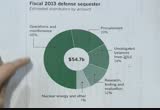tv Washington Journal CSPAN December 10, 2012 7:00am-10:00am EST
7:00 am
lexington institute. then the latest from egypt. "washington journal" is next. ♪ host: president obama and john boehner met yesterday afternoon at the white house to avert the so-called fiscal cliff. their first meeting in 23 days. both sides are not saying what if any progress were made. washington has 22 days left to me -- make a deal. "the post" had lined, "a deal is a vital." what are you willing to sacrifice to avert the so-called this clip?
7:01 am
for republicans, 202-585-3881. for democrats, 202-585-3880. for independents, 202-585-3882. remember, also, send us it twitter message, the analysis is that americans need to embrace sacrifice again. he says that any outcome of this is going to require sacrifice and pain from the american public. in the peace he writes that the problem is not washington, that it is us. no longer are we willing to pay for the things that we know that we need. boaters that demand something for nothing will demand otherwise. politicians who fear for their
7:02 am
jobs will comply. we want to turn to all of you and ask you, what are you willing to sacrifice? are you willing to change medicare and social security as republicans say is needed? are you willing to increase taxes, as democrats say is needed? first we show you, from yesterday's "face the nation," erskine bowles, who had this to say about spending. [video clip] >> if we are going to raise revenue in any form, we had better cut spending. that is the biggest part of the problem. the biggest part of that problem is the fact that health care is growing at a faster rate than gdp. host: there it is, he says that it has got to be on the table
7:03 am
7:04 am
7:05 am
be the last thing that they attack. those of the things about the budget, to meet, i am not saying that we do not need it, of course we do, but they need to be looked at. if we do not look at it and we get things like rock star generals with biographers, that sort of thing, somehow the economists, specialists, and experts never mentioned the defense budget. host: you are the perfect first phone call, that is what we are focusing on today on "the washington journal." for the whole part of the show we will be talking about defense, sequestration, and what it means for the pentagon. we will develop the entire show to that discussion. stay with us for the rest of it. "the washington post" reports on military contracts.
7:06 am
it says here "over 250 contracts with a combined value of $21 billion, a 44% drop from october." it shows here the top five contracts in november by value. boeing was at the top of the list with a $4 billion contract for the air force. delta dental got a $6.2 billion contract for retiree coverage. then that is followed by battle space. those are some of the top defense contracts in november. that overall no. 4 defense contracts is down 44%. republican line, alaska -- arkansas? where are you from? caller: hold aligned.
7:07 am
off a cliff. the fiscal cliff goes. take the pension away from the politicians that gave us in this place. host: what does that solve? caller: give us back our country. pioneers, those people in south chicago, detroit, oakland, houston, many parts of florida, atlanta, washington, d.c., they are in trouble. host: why are you going to do fine if we go off the fiscal cliff? caller: i live on the beach. i live a lifestyle where i cut my own fish, raise my own garden, hunt my own game, i do just fine. host code no sacrifice from you,
7:08 am
then? all right. jerry, ohio, independent caller. go ahead. caller: they should let it go. let the bush tax breaks expire and go back to the clinton taxes. it will hurt people a little bit, but it will hurt the wealthy more. i believe that jobs will come back if we do that. host: what about automatic spending cuts? it is not just the defense department that gets cut. non-defense, education, health care, across the board getting cut? caller: it would probably only be cut for a short time. host: so, a sacrifice by letting tax rates go up? caller: right, they will start working together if they wind up
7:09 am
going off the cliff. host: what do you think about addressing medicare spending? caller: the biggest thing the government has to do is all of the waste in everything. defense, medicare, everything. just go after it. host: is that enough to get through our deficit and debt? caller: and raise the taxes. host: all right. mike come massachusetts, note -- mike, massachusetts. go ahead. caller: i am x military. the only reason i say that is that we have spent $2 trillion on these wars over the last 10 years, which is a whole lot of money and they say they are going to review their approach to these in the future because we get so much money. as far as the entitlements go,
7:10 am
what they should do is agree on the taxes for people making under $250,000 per year first, then come back and fix the rest of it. that would probably be the best way to go. that way the republicans can save face and say that they refused to bend on taxes and that that is what they will have to go back and do later, for sure on that note. host: also on the sunday talk shows yesterday was senator bob corker. here is what he had to say. [video clip] >> realizing that we do not have a lot of cards when it comes to the tax issue before the end of the year. it will leave the presidency and the senate in the hands of the democrats. many people are putting forward a theory that has merit where you go against the president
7:11 am
with a 2% increase on the top 2%. all of a sudden the shift goes back to entitlements. all of a sudden once you give him that tax rate, lesser that what he has been talking about, the focus shifts to entitlements and puts us in a place where we can actually do something to save this nation. i am actually beginning to believe that that is the best route for us to take. host: senator corker, saying that there are more republicans willing to do that. you heard him lay out the strategy there. lots of debate in washington about who should give and how much. we are asking you to weigh in on that conversation and tell us what you are willing to sacrifice. this comes from a piece from a few days ago, from "national
7:12 am
journal magazine." it is about americans not willing to sacrifice any more. "what happened to americans' ability to sacrifice? the idealistic children of the greatest generation -- host: roy, colorado, independent caller. what do you think? caller: i think the american people sacrifice everything they have for this country. if these people would quit the
7:13 am
wars and rebuilding other countries, they could rebuild this country. host: no sacrifice from you? caller: the american people sacrificed everything they have for this country, going to war. why should we go blow up another country and then rebuild it? host: this twitter message from old white guy -- host: then here is cindy, excuse me, jim on twitter -- host: finally, joseph ramirez -- host: jennifer, louisville, kentucky, democratic caller. caller: i just wanted to say that even though we are sacrificing, we have already
7:14 am
sacrificed enough but like the gentleman said before, i do not think it is a couple of trillion, it is more than that the we have spent on the war that has been going on. america has just gone down the drain. everything is just pitiful. also, one thing, the business, the small business, they should have a small -- a higher rate than $250,000. that is it. thank you. host: here is the kaiser foundation with their facts about medicare. they say that it is for 50 million elderly and disabled americans that pays for prescription drugs, hospital visits, and acute and post-
7:15 am
7:16 am
larry, independent caller. go ahead. larry, syracuse, new york? you are on the air. turn down your television, ok? caller: yes, basically i am willing to give up -- i think that the people who get benefits who are wealthier should actually be along the strip. host: all right, steve, haymarket, virginia. caller: i used to make $3.5 million per year in gross and it usually only cost me $3.6 million to do it. i paid over $1 million per year in 20 years.
7:17 am
you know what happened? i got put out of business by the irs. i do not think people understand what riches. by the way, i kept 35 families supplied with money, health care, and everything. in gratitude, the government put me out of business. the fiscal cliff is something that we need to go over, that way we can enhance our military to special forces and get us some better weaponry. lose the people who are vacationing in all of these foreign countries, limiting the military to doing what it absolutely has to do. host: you are probably the fourth person here who has said we should go over the cliff. the headline from november in "the financial times" was that
7:18 am
the fall in consumption would be $200 billion if we go over the cliff. that the u.s. consumer is crucial to growth, they went on to say, because it made up 70% of gdp. some are predicting a recession, a downgrade of our rating for the country. you think it would be ok to go over the cliff? caller: put it this way. only in the last 2000 years of human existence, every time a country goes above 20% tax rate, they failed. rome, babylon. go throughout human history. we are saying it is a 50% tax rate now. what about an 80% tax rate?
7:19 am
we cannot survive as a government entity by having so many man hires attached to the host. host: another item attached to the table for debate is whether or not to extend the payroll tax holiday. this headline states that there is little interest in renewing the tax holiday. it is now 4.2%. the average annual savings for employees earning about $60,000 per year is 1200 thousand dollars -- well hundred dollars more in your savings account. -- $1,200 more in your savings account. there is not much interest on capitol hill in saving this. we are talking about getting access to the pockets of 160 million workers. john, independent caller, go ahead.
7:20 am
caller: if americans would just stop allowing themselves to be fooled by this dog and pony show. these parties are in it together. you have a 35% federal rate tax. property tax, town, county, school. you are already paying 85% of your money. how much do they want? this bailout of $787 billion was a commitment to the bank that held $30 trillion of your money, america. until you learn what these people are doing to you, they have been doing it for 70 years. democrats in charge, republicans in charge, this train goes forward no matter who is running the show. host: what is the alternative?
7:21 am
caller: get rid of every last one of them. our founders fought a war over it. they are already taking 85% of our money. americans are too busy watching football and drinking budweiser. host: sarah, democratic caller, seattle, washington, you are next. caller: hello? host: you are on the air. good morning. caller: i know a lot of people is talking about the 1%. i do not think a lot of americans notice that. i used to work for that 1%. they pay you $60 per week, they pay out the difference and give you cash so that they do not have to pay taxes. people shopping at bloomingdale's and all of these stores, they buy it before it
7:22 am
hits the rack. the way that they perceive us is as dweebs. they do not like us and never have liked us. you think we are talking about the 74%? the 37%? they do not understand that we work hard. americans are the hardest working people. we have to jobs, three jobs, many of us are going back to school. we are not sitting around doing nothing. host: this prediction from facebook. these comments, democrats -- host: from bragg on facebook -- host: let me give you some other headlines as we continue this
7:23 am
discussion this morning about the fiscal cliff. this is from "the washington post." "egyptian opposition confused over next step." host: also from "of the washington times" this morning -- "hillary clinton will testify on the hill." "and no date has been announced for her testimony, either in open or closed session. the state department has put forth and accountability review board and that is investigating the attacks.
7:24 am
host: burke, new orleans. what are you willing to sacrifice? caller code good morning. i think that we are spending way too much on this drug war. it is costing the nation way too much at the end of the day and we need to reevaluate ourselves on it. i am for reducing revenue. we should adopt a poll tax in this nation or a transaction tax
7:25 am
on security. i do not know. the lancelot. host: all right. -- thanks a lot. host: all right. this headline, "the u.s. knew for years about the benghazi extremism." front page of "the new york times" has this story, "mortgage crisis brings a new reckoning to banks. in the worst case for the industry, the bill is near $300 billion." this is from the money section of "usa today." "future possible, the federal reserve is expected to take another step tuesday to stimulate the lackluster recovery with more treasury bonds to push down long-term interest rates bahut -- interest rates.
7:26 am
host: also sticking with housing, from "the wall street journal" this morning, "high earners dropping scrutiny." "hundreds of senior managers that earned more than $200,000 last year -- host: charleston, west virginia, democratic caller. what are you willing to sacrifice? caller: i would not mind paying a little extra in taxes if i thought it was really going to
7:27 am
help. one thing that people have to remember, the current tax burden on the american public right now is the lowest it has been since 1959. that is the year i was born. one friend of mine who makes over $250,000 per year, which entitle him to the bush era tax cuts, he is now complaining about the tax cuts expiring, meaning that his annual taxes would go up by $4,000 on his salary. if you divide $400,000 into 200 fit -- $4,000 into $250,000, is 1.6%. if $1.50 per day magically appeared in my pocket every day, i would not complain, but at the same time i would not really
7:28 am
miss it. i would not mind sacrificing that little bit if i thought it would help us to get out of this mess. when people say that over $250,000 people are worried about the bush tax cuts expiring, i am thinking -- what are they trying about? host: take a look at entitlements from "the washington journal" this morning.
7:29 am
host: what do you think about that? caller: when it comes to entitlement cuts, they do not bother me that much as long as you are applying those to future participants in the system. but people, i am 53 years old and had been paying into the system my whole life. paying into social security and those other programs all my life, paying my fair share. if suddenly my fair share, the amount i paid into it would be cut back, that would bother me. if you were to apply those cuts to future employees, it would make it a lot easier for people to swallow. host: here is the analysis from
7:30 am
7:31 am
i teach other health-care professionals how to do this work, it is important work, but i realize it will never make me rich. it is still very important work. an anesthesiologist might make 10 times as much for your as i do. does that mean? he works 10 times harder? no, but i understand how jobs are marketed in this system and i accept that. i just think that people in these very high income brackets really ought to be able to pay more into the system as a result of them being able to take advantage of how those jobs are marketed. host: we will hear from a republican next to get their take on it. first, this is from "the
7:32 am
washington times." "democrats have already made compromises on entitlements and spending cuts." host: john, asheville, north carolina. you are up. what do you think? caller: people like chuck to just called a minute ago are part of the problem. they are not willing to realize that they are robbing future generations, my kids, my grandkids, their kids, their grandkids of their prosperity. everyone says that they paid into social security all these years. you paid a tax. go look at the facts. the supreme court said that social security withholding are a tax. you are not entitled to money from the government based on that. yet people say that this is my
7:33 am
money, i paid into it all of these years. what you're doing is contributing to the debt for more than military spending and you are robbing my kids, my grandkids, your kids, your grandkids, your great brand kids, great great grandkids, of future earnings. that is a fact. so many people think they are entitled to a handout from the government. i tell you, i have worked all my life and right now i am making far less money than i used to and i did not make a whole lot now. i hear people saying that i do not pay enough in taxes. i should be able to retire at 65, but that is not going to happen. why? the money that everyone is taking now is not going to be there for meet. i have lost that money paying into social security. i cannot get it back.
7:34 am
i cannot plan for my own retirement. i have been unemployed for over two years and am working really hard to find a job that will keep me paying for my kids' college, keeping my kids in food and clothes you are robbing me as well. -- clothes. you are robbing me as well. host: this from -- this headline over the white house -- "urgency over talks increase."
7:35 am
host: we will have live coverage of president obama as he heads to michigan at 1:30 p.m. eastern time. he will be making those remarks in michigan, pushing for his case in the so-called fiscal cliff talks. back to your phone calls. democratic caller, the vienna. caller: i have one thing to say, probably two. there should be a fair tax on everyone. that man who was running for president, i cannot think of his name right now, he had the 999
7:36 am
plan. the rich, the poor, they would be taxed 999. i think that that should go into effect. as far as welfare, we should bring back or bring in the u.s. collecting welfare and go ahead and put drug testing in their. people testing positive for drug use, crack, cocaine, they should be pulled off of welfare. get that money back. i think we should all sacrifice the tax that everyone on their income would not have to pay. host: ok, that was wilson from louisiana.
7:37 am
this headline is from "the baltimore sun." "a clash over supreme court cases." the piece goes into two justices and their coalition sunny side, when the court takes on gay marriage cases. there's a front-page story about a woman at the center of that case -- "and gay marriage, a case of devotion." "she has won the attention of the supreme court over estate taxes." host: true deaths continued to decline -- "troop deaths continue to decline." "in 2008 there was a 32% change
7:38 am
." on the decline, that is the report from "usa today." "the washington post's" has this associated press story from yesterday. here is what the president had to say. "yesterday our special operators rescued an american citizen -- host: we have a few minutes left, we are talking about the fiscal cliff and what you are willing to sacrifice. glendale, ariz., republican
7:39 am
caller, go ahead. caller: this social security, some rocket scientists figured out that we do not need energy that we do not need, paying for these increases for two years. now they are reviewing it and i am just sort of disappointed with our people up there. they just do not seem to understand that they are not doing their job. this crisis, everything that happened, the people are not doing their jobs. the only way to get rid of them, i am just really disappointed. host: i assume you are on medicare? caller: yes, i am. host: how much do you get each month?
7:40 am
caller: $1,200. i am also on disability. my pension and stuff. they always bring it back to the older people. they always want to tax us for the problems that they create. host: what do you think about the idea of raising the eligibility age for medicare over a certain amount of years? caller: it depends on the operation you are in. i was a mechanic and my knees went to hack. i do not know what they do with people like me who have a job that you have sacrificed your body for. what happens then? host: this is a q and a piece from "the baltimore sun."
7:42 am
host: don, new bedford, massachusets, go ahead. good morning. caller: good morning. when we talk about sacrifices, for the past four years we have gotten this election. here we go again. it feels like an ongoing election. gas prices are high, electric prices are high. food prices are high. there is your sacrifice right there. judy, if taxes go up on the middle class and they start doing all of these cuts on wall the stock exchange is going to turn around and lose out.
7:43 am
corporate profits will continue to go down, go down, and that bubble is going to burst. host: ok, fred, independent caller. caller: thank you for c-span. a quick issue that i have, i was a republican that recently changed to independent. both parties are not looking to help the middle class. i can say that because i have known my home since 1991, my taxes have more than doubled. they have reassessed the property to increase the taxes even further. at the same time, if there is a fiscal cliff issue, who is going to benefit? not the taxpayer or the middle- class. we what -- we will wind up with taxes increasing at the state level, which means again they have to feed the beast, the
7:44 am
beast is the government. the first people to sacrifice for the government are the government people themselves. the federal government employees, 2.2 million people collecting incredible pensions. you just read an article about people that make $388,000 at fannie mae and freddie mac. why are those people not sacrificing? why do we have to pick up the feed that they eventually give us? one gentleman from new york talked about that. i do not have a pension plan. i am 62. i will need social security. my house has twice as much taxes on it as it used to. no one helped me on the fiscal cliff when i lost out in 1991. today everyone gets help. chuck schumer today said that he
7:45 am
will want to give tax benefits and credits to people in new york city. who is going to pay for it? host: that is the story from the papers this morning. senator schumer, senator melendez, proposing tax breaks for storm victims. our conversation will continue. next we are looking at the pentagon and the automatic spending cuts and what they mean for the defense department. that conversation will continue from robert levenson and a roundtable discussion on that later on. we will be right back. ♪ [video clip]
7:46 am
>> i think that people still love discovery. they are ready to find it surprises. every month, every year, i giggled a little bit about some show that people are talking about that you could never have imagined choosing. if you came to me and said -- mike, i want you to choose " honey boo boo," or certain food channel networks, i do not think that if i had to predetermine that as a preference, i could not have. but to hear people talk about them, going into an environment like that, i white say that i actually like it. -- i might say that i actually like it and that is still a huge part of the american television experience that gets sold short by talking about anytime, anywhere now.
7:47 am
there is a certain amount of escapism and passivity in roaming around the television jungle, finding things that you did not know were there. >> michael powell on the future of television, tonight on c-span 2. >> "washington journal" continues. host: we are continuing our series, looking at different parts of the fiscal cliff talks. joining us now is robert levenson, a senior defense analyst at bloomberg government. let's begin with what secret -- with what sequestration means. caller -- guest: it is a funny term. if you have looked it up on google 20 months ago, it would have something to do with coal and carbon, but this is about
7:48 am
automatic cuts going into place known as sequestration. host: how did this come about? where is it headed? caller: as we recall from last year, there was a crisis over raising the debt ceiling. republicans demanded some cuts from congress. they agreed to $1 trillion in cuts, they handed over $1.50 trillion to the super committee. because they failed to come up with a deal that could be approved by congress and the president, those automatic cuts go into effect, $1.20 trillion over 10 years. the first cut will go into effect on january 2 of 2013. host: how are the defense sequestration cuts being applied? are we sure? guest: we are not exactly sure,
7:49 am
but the law says that every program and activity must be cut by the same percentage. there may be some flexibility, but the understanding is that you have to go across the board and cut everything by the same amount, estimated to be about 9.4% in the case of the pentagon. host: what is on the table for the pentagon? guest: everything can be cut, but the president has the power to exempt military personnel, and he has indicated that he would do that. everything else is basically on the table. weapons systems, operations maintenance accounts, protected service member salary, all of those services are part of the great man's budget. host: what about procurement?
7:50 am
caller: things that they buy. -- guest: things that they buy. and again, all of those programs, like the 30 -- like a fighter jet, that is on the table as well. host: military construction, what is that? guest of the money that the military spends to build the bases and various other facilities. host: testing and evaluation, is that big money? guest: it can be. before weapons systems are built there is a whole research and development fund. host: let's talk about what is not on the table. guest: the military personnel are not on the table. retirement, mandatory spending, not on the table. pensions for people who have retired from the military, those are not on the table, but
7:51 am
basically everything else is. host: no base closures? guest: that is because of the law. sequestration cannot result in a base closure. they can downsize the base, close units, but they cannot close an entire base. that would require a closure commission and congress would have to approve it. host: the last point we are showing our viewers, funding for the war in afghanistan is not on the table? guest: effectively, it is, but it was thought that originally there was an exemption for funding in afghanistan. the pentagon has said that they would get everything they have to for those troops as long as they are fighting. host: if the automatic spending cuts go through, who makes the decision about what gets cut?
7:52 am
guest: the office of management and budget will help to craft this, saying that this is the percentage and this is what you have to cut. there will be some sort of interpretation, and it may mean different things in different areas. for pure -- for procurement and maintenance accounts that are more flexible, it could give the pentagon a lot of latitude to decide where they want to cut things, cutting and lower priorities. host: if sequestration goes through, we're talking about $109 billion? guest at a split between the pentagon and non-defense spending. host: what impact do you think that that has?
7:53 am
guest: and lot of this money would not be spent in 2013. it is probably about $30 billion that will actually be fell. but there will be some impact. like i mentioned, health care, $3 billion taken out of military health care. you still have the same number of people who served. i spoke to senior officials at the pentagon and they said that there was no way to do this. they would see if there was more of an effort that could be made towards retirement, but it is questionable. there will probably be an impact in operations and maintenance accounts. research and development, that money is often spread out over many years. you do not feel the pain as quickly as you did in the operations and maintenance area. host: we are speaking to robert levenson -- robert levinson. for republicans, 202-585-3881.
7:54 am
for democrats, 202-585-3880. for independents, 202-585-3882. we have a special line set aside for those in the military defense industry. 202-585-3883. glenn, lancaster, go-ahead. caller: obama just did an executive order for people that do not belong in the united states to get free health care and medical schooling. there is another thing, the cartel's send them here and they are bringing the drugs, the crystal meth, the heroine, the bad drugs into the united states. we need to cut them from our welfare systems. we need to stop paying interpreters for them. they need to learn our languages
7:55 am
and wait in line and not make any cuts to our military. we need them. put them on the border, our schools and hospitals, send these people home. host: a national security issue, these pending cuts, is it that? guest: there has been some hyperbole over this traumatic impact. we are talking about 9.4% in 2013. the more significant factor is not so much to be about -- not so much the amount as it is the across the board factor, making decisions on where it is most prudent. that is the real damaging part. host: we have shown you this, but here is another graphic from the fiscal 2013 sequestration, the estimated distribution for 2013, that overall number, $65 billion. the percentage of the different
7:56 am
areas that could because if this goes through? this is from south carolina. caller: my husband spent 21 years in the navy and every year on a ship they were ordered to push equipment off into the ocean so that they could get an increase in their budget to buy more stuff for the next year. we are buying tanks that the military does not use. i think that the pentagon could save money by using better buying power, teach those guys to save instead of throwing it in the ocean. guest: better buying power is the name of a pentagon initiative. everyone recognizes that their budget, which has not consistently since 1998,
7:57 am
particularly a lot in the last 10 years, they are coming down on sequestration and something else, and there is a lot of push to buy smarter. there is a feeling that there has been some waste when you are flush with cash and the pentagon is looking for ways to lower their buying costs and get more value for taxpayer dollars. host: when you look at major weapons systems that could see a scaling back in spending, the predator drones aircraft, joint light technical vehicles, talk about these weapons systems. guest: at 35 is the largest program in the history of the pentagon. the procurement goes out like 20 years. there is a total for the united states of a couple of thousand of these aircraft. it is a very expensive jet and
7:58 am
there have been some delays on the program. there is a lot of talk that the program will need to be scaled back. there is skepticism from the partners and rumors from canada that the canadiens are reconsidering their purchase. that has not been confirmed yet and is still sort of an open question. this program is huge and has been somewhat delayed. there have been cost overruns. host: mike, connecticut, go ahead. caller: i work for small business. all that we do is defense manufacturing. i agree that the costs get out of control. procurement is an issue. for instance, we get solicited to sell one bolt for repair kits. i offer them a minimum buy of
7:59 am
$300. the buyer only needs one, but i offer him 10. he will still buy one because that is just the weather system is set up. host: do you know why that is? caller: my guess is that it costs money to inventory what they did not need. that is the one variable i can think of saying that maybe they cannot inventory that. there is only so much warehousing space. guest: -- host: because of that, does your company always think they have to have a minimum buy? caller: we did not, there was military packaging with identification.
8:00 am
it goes on and on. we have to cover ourselves in case the contract required us to ship to another country. there's a lot of things involved. host: mike, to you think your company makes money? caller: i would say it is a 50/50. yes, we keep the balance going. host: ok. guest: he is right. the pentagon is the largest bureaucracy in some ways. sometimes there are a lot of rules that probably do cost a lot of waste.
8:01 am
the pentagon cannot be audited. in some cases it is hard to keep track of this money. some things do not seem to make a lot of sense. lotle begin to take ita harder look at some of these things. host: commentary section of "the washington times." he was the staff director and he notes that they found no fewer than 800 laws governing everything to post employment ethics. guest: congress has gotten very
8:02 am
involved in procurement. there are laws that go back to the civil war. the congress tries to legislate these things and tries to put in rules to prevent what ever the next problem is that will creep up. i would not doubt that figure of 800 laws. host: "the washington post" reports this morning that pentagon awards are down. do you know what is going on here? guest: the pentagon budget is going down so contractors are going to drop. there may be some going on where
8:03 am
they do not want to sign a contract and said, "let's wait until january 2 so we will know how much money there is." there could big holdback going on until january. host: good morning, ron. you are on the air. caller: we are not looking at the right thing. like the congressman and the lobbyist. they are not putting any skin in the game. they are not making sacrifices. look at what their pensions are or social security. why do we have a limit on rates
8:04 am
-- this is too much money. how about we spend as much money as it makes. .ook at the money you'll save host: robert levinson? guest: the caller is right about the united states spending as much as the next 17 nations combined. many of our allies like france and england. the united states is a global power with global responsibilities. it is a real sense of debate. our budgets tends to come down after we fight wars. what is the appropriate role for the united states military in the world?
8:05 am
maybe allies can take care of this and maybe we do not need to do. host: how much do we spend? guest: about $600 billion a year from year to year. it is hard to estimate countries like china because they are now pricing things the same way. they have large land forces and they are not deployed across the world. submarines and missiles. china is probably number one on the list. host: this from twitter. guest: that refers to overseas
8:06 am
contingency operations. this is a fund that paid for the wars in iraq. it is about $88 billion in that account. there is a pentagon and washington funny math. some people say if the project out, we will save all this money. i wrote a report about saving $1 trillion. most of our troops will be out of afghanistan by 2014. nobody expects it will spend this level of money going out the long term in the future. so the $1 trillion in savings is
8:07 am
money we would not have spent anyway. there are some built-in drawdowns in the defense department. in.se were built an about $487 billion over 10 years. they are coming back down. about 100,000 or so and they are built into the system. the pentagon is looking at things that way. host: roger in texas, republican caller. go ahead.
8:08 am
caller: i am amazed i got through. i think we need to understand that we are going through tribulation. a broken american heart. host: can you tell us a little bit more? caller: the obama nation must fall and the american heart will break. host: ok. ed, are you in the military? caller: i am retired military. does he know that the military has a plan to handle the sequester? guest: for a long time they were directed not to do any planning. they were told to keep spending
8:09 am
money. they have come off of that in recent weeks. they are looking for this thing. some people in back rooms have been doing this for some time. "what happens if we have to take about 9.5% out of our budget?" they have not released a specific plan. they are waiting to see if the congress and the president can agree. host: we talked about what happened with contractors. a 44% in contracting. for contractors, a reduction in new contract awards --
8:10 am
host: what is the impact of this? guest: if the pentagon has less money, there will have to look at all the statements. the pentagon does not want to break existing contracts. they could be forced to do that. that will slow down. when you take 10% away from the budget, everything is sort of on the table. those contractors do not have a lot of flex. if their orders get cut, that could mean job losses. it will affect the bottom line. vista, oug from this
8:11 am
california. host: what slip by in the answer -- look at china. they are not as technologically advanced as far as military. they have one aircraft carrier and a small air force. that question was dodged. wheat dominate militarily and with nuclear-weapons compared to the rest of the world. there was a fear that it would become too powerful. here we go again with across-
8:12 am
the-board cuts when we should be looking at the contract situation. there is a system with the defense department and contractors. there is a lot of waste going on in purchasing. the defense department succeeds all other areas of government. everybody supports our defense. i believe are most important national interest is our own people and putting the funding into rebuilding the urban areas of the united states and bringing poor people up to a standard of living where they can get by. we spent over $300 billion on and afghanistan.
8:13 am
guest: the caller is correct when he talks about china. they are just barely beginning to use aircraft carriers and things like this. they are much more focused at home. it is of concern a rise in china but not at the level of the united states. that is a concern. it is a time for real debate in this country about where we go. it is time to relook at our national priorities. everybody thinks the pentagon is on the table. host: that is why we are focusing on this this morning,
8:14 am
focusing in on the pentagon and sequestration. that call it put the figure of the wars at $300 billion. gher.: i think it is hir it probably goes higher than that number. host: overall? guest: the oco funding got up to about $170 billion at its highest point. it is well in excess of $300 billion. we are probably talking close to a trillion dollars, depending on how you do the math.
8:15 am
host: paul, are you in the military? caller: retired. host: go ahead. caller: we had a certain amount of money we had to spend on repair ports every quarter. we were told if you do not spend it, you lose that money for the following quarter. we bought all kinds of things we did not need. you get a part that breaks, you cannot afford to replace it. certain items, you cannot have a spare. if you say i have $5,000 this
8:16 am
quarter to buy parts and i only spent $2,000, i should lose that money for the following quarter. that should be held passed the deadline of spending the money to buy the real part that breaks that i need. host: whether any other consequences to not spending what you were supposed to spend? caller: i had to spend that money that i was told i had to spend or i could not use it any other time. i have a part that breaks later on. i do not have the money to buy the part. host: we understand that. any consequences for you personally when they do not
8:17 am
spend the money they are supposed to spend? caller: not for us personally but for the squadron of the ship. guest: i was in the military for 20 years. at the end of the fiscal year, there was often time a rush to spend money. it is true. perverse incentive is you do not have a lot of incentive to save money. congress would say, you didn't need the money. it is the end of the fiscal year, better figure out what to do with the money. it is a real problem. the pentagon has struggled to
8:18 am
find better incentives to save money. they would give you the individual a percentage of the savings if you can up with an idea to save money. it is problem to not spend money. host: how does the pentagon calculate how much they are spending? guest: congress has pushed the pentagon to audit it spending. they are preparing for an audit so they can track all of the dollar s. they play around with the budget and it goes to congress and perhaps it's changed a little bit. it is difficult to track every
8:19 am
nickel the pentagon spends. a lot of ambiguity has involved over the time. the united states would draw down its forces and go back to a militia nation after each war. we continue to expand the department of defense. it is difficult to get control of all of those dollars. it has hired a lot of outside people and consulting firms and is trying to put those mechanisms to track all of those dollars. it remains to be seen how successful they will be. host: when is the first deadline/ guest: 2014.
8:20 am
host: zack from new hampshire. caller: good morning. i have a question -- when we first decided to go to war, was there any spending cuts prior to that? we knew we were going to be spending all this money. why are we just now doing all these cuts? shouldn't it have been done throughout the war? guest: we did not cut any of their spending. we cut taxes at the same time. there wasn't any offset for the war costs that the pentagon has incurred.
8:21 am
there was no offset. some of these things were proposed but never taken seriously by members of congress. we never cut spending in other areas to pay for the war. host: matt, go ahead. caller: i am a disabled now. i was private cabinet maker. i maintained 75% of overhead to build shipping crates made out of wood. the specs were pretty rigid. different sized crates. i did that in 25% of my work time it week. it may my kitchen cabinets more affordable and i could reach a larger audience.
8:22 am
every week i had to ship the same dollar value of crates. the dollar value never changed. when the economy turned bad, i was willing to cut my price on my crates. my overhead was not going down. it was more trouble to cut the price of the crates then to get the job to build the crates. i see how the system is so ludicrous. i have friends that orca raytheon -- that work at raytheon. what about putting the pentagon on the twitter or e-mail system where the people who are working in the military can report the
8:23 am
waste without repercussions. these people have to be guaranteed no repercussions. we would cut our military drastically. guest: there is waste in the system. there are some hot lines and there are some whistleblower protections and some things do occasionally come to light. some of these things do overtime get fixed. there are some hard choices the pentagon has to make. if your item meets the minimum technical requirements, we will go for the lowest priced item. the push for that stuff is
8:24 am
nowhere. everybody will take a harder look at those dollars. people say to cut waste, fraud, and abuse. let's not do that anymore. if you take the money away, people begin to find the waste. we will probably see more of this over time. host: what is leon panetta saying about this? guest: he is concerned about sequestration. i think what he resents is this across the board meat axe approach to cutting the budget. they went through a strategic review and a look at u.s. global
8:25 am
strategy and built a calculated way to balance all of the needs. we need this level of resources. if you take with those resources, it upsets the whole apple cart. they have to go back to the drawing board and that becomes difficult for the department to do. secretary panetta has asked for them to come together. the white house says they do not like sequestration either. the analogy everybody uses from the movie with the sheriff says "stop or i'll shoot" with the
8:26 am
gun to his head. it will force us to do something else. they are getting close to pulling the trigger. nobody likes this. host: seadog on twitter says this. guest: that is my home state of virginia. 13% or 14% of the state's economy. the pentagon is and virginia. then there's the norfolk- chesapeake bay area. virginia is the number-one recipients. california is a big state with defense contracting in the southern part of the state. host: back to twitter.
8:27 am
next.hihugh is caller: good morning. i find it in the debate about americans' defense budget that there is a lot of mythology and misunderstanding because people don't understand what it relatively small percentage of the american economy is absorbed by the economy. the number quoted at the beginning of the conversation about our defense budget, there is some discussion from a few viewpoints. what percentage of the american defense budget is absorbed by salaries and benefits relative
8:28 am
to the equipment? people have an image of tanks and airplanes which has been restricted quite a bit. look at the humvees at the beginning of the iraq war or the shortage of the body armor. that is being reflected in acquisitions of first-line fighter aircraft, tanks. i don't think the public understands the age of the aircraft fleet is approaching or exceeding the age of the pilots. guest: about a third of the pentagon budget goes to personnel cost. that is the salaries and health care and housing. in large part of the health-care bill is guys like me.
8:29 am
entagon pays my health costs. host: even though you have another job. guest: that is correct. i pay a small amount every year. my wife and kids can stay on until they are 26. the pentagon is billing my employer. these costs are growing. if they cannot control the personal cost, it begins to squeeze the other things. the personnel costs keep going up and up and up.
8:30 am
the pentagon has to figure out a way to control those costs. host: under sequestration, tri- care is on the chopping block. that is something the pentagon would have to look at. guest: tricare is roughly shy of $50 billion. this pays for the active duty people and their dependents. they have no co-pays or deductibles. there's a program called tricare for life. it is a large population of people taking care of, almost 10 million.
8:31 am
tricare funding comes out of an account that is not the personnel account. the personnel will not get cut. there is about $30 billion out of the $50 billion that is all the other stuff. 10% is $3 billion that you have to take out if sequestration goes into effect. host: civilian jobs would be cut. who would be cut? guest: around 100,000 folks could lose their jobs. civilian employees of the , theirent of defense
8:32 am
salaries are part of that. the pentagon has to figure out ways to do that. they can furlough people for up to 20 days. you may see a series of rolling furloughs would they say, you go home for 20 days, so they do not have to pay any severance cost. we may see something like that. their salaries are on the table. you cannot cut their salaries. host: mckinley in detroit.
8:33 am
caller: good morning. i didn't catch your name. host: rob levinson. caller: the budget control act -- the purpose was to improve the cost of doing business, correct? guest: the purpose was to allow the country to raise the debt ceiling. i don't know if that much beyond that about improving the cost to do business. getting the spending down. caller: ok. obama, his plan is to sign the supporting bill. guest: he has to sign a sequestration order if he and the congress cannot agree on something before the state.
8:34 am
caller: john boehner is sending forth a plan. guest: both the president and speaker boehner have ideas about avoiding the kind. there is some distance between them on taxes. both sides are looking for ways to compromise. caller: ok. am i understand this correctly? the pentagon made sequester 13%. is that correct? guest: the bill is about $54 billion. at is the number the pentagon has to take out of their 2013. that is about 9.4% of the
8:35 am
budget. caller: ok, thanks. host: troy in pittsburgh. caller: they should have thought this out before the war got started. they did were bonds and raised -- they did war bonds and raise taxes after world war i. this war is still going on. they are still fighting overseas. guest: everything started with 9/11, and that was thrust upon us with a horrible attack. now we are at war and we have to fight these things. there wasn't a lot of thinking
8:36 am
about how to pay for this. we did were bonds -- war bonds in the past. we continue to lower taxes and to fight the wars at the same time. host: looking at contracts in november, the foreign military fail program. what is the -- foreign military sales program. guest: we provide the equipment to our allies. in some cases, the allies pay for it. we give israel about $3 billion a year which they spend it on our military hardware. the funding comes through the
8:37 am
state department but is managed by the department of defense. it is a way for allies to purchase u.s. equipment. host: this comes from "the washington post." guest: saudi arabia is paying for their own stuff. some of that will be managed by the pentagon. host: they will be spending their money on this. guest: they are spending their own money. it still goes to the foreign military sales program. givingaying the bill and money to the other country so they can buy our stuff. caller: i was concerned about
8:38 am
the status of the united states postal service. i am retired. i was trying to find out where our u.s. postal service is going or how if congress will help us out so our jobs will continue for those that are still working there. we haven't received a cost-of- living raise in the past three years and i was concerned about that. guest: the postal service is unusual. they are funding with the stamps that we buy. congress has put in some money. that's not affected by the sequestration talks. host: this comes from twitter.
8:39 am
guest: i do not think anything is by design. these things in some cases go back 100 and 150 years. virginia 14 president obama this year -- the virginia this time 14 president obama. i do not think that is anything by design. california gets a lot of defense dollars. he doesn't like it either, carl levin. levin is part of -- he and john
8:40 am
mccain did not like this and are looking for ways to avoid it. the debate is between the house republicans and the president. the senate is along for the ride. host: we showed a picture of buck mckeon, republican of california. does he have a say in the negotiations? guest: absolutely. he has been vocal about the damage sequestration could do. he wants to see the pentagon avoid it. he has a bit of a buyer's remorse.
8:41 am
he is lamenting the fact that the pentagon was placed at the kind of risk he feels are right now. host: frank, what is your background? caller: retired national guard. what is the situation between officers and enlisted? i do get tricare and all the benefits. how will the sequestration affect me? guest: in terms of the ratio, it has been going up. a lot of people in congress are concerned that there are too many generals. the air force has been under criticism for the number of
8:42 am
generals it has. the ratios are much higher than they use to be. as a budgets come down, those things will have a harder look. tricare is on the table. there could be $3 billion taken out of tricare. how that will be taken now will probably be up to the pentagon to decide. there will probably go after the retirees. probably not people over 65, but people like me who have health insurance from another source. congress has always shot them down. they may look to those working
8:43 am
age retirees back get tricare. host: is that in one year? guest: that would be the cut for 2013. fiscal 2013 has already begun. host: mike is a democrat from florida. caller: good to talk with you. i lived all over the world. one thing that surprises me is how the hindsight about wars that didn't have to be declared in the first place goes forward then they start cutting benefits and got to the guys that make the great sacrifice. iraq was an undeclared war. wars are expensive.
8:44 am
let's look at $1 trillion in iraq. people forget there was a no- fly zone around iraq and an embargo that had saddam hussein under control. guest: we have not formally declared a war since world war ii. wars are very expensive things. they consume tremendous amounts of resources. and the health care of the wounded veterans that come back from the wars. we did not examine how we are going to pay for that. host: if there is further military action in syria, does
8:45 am
that have any impact? guest: the pentagon would need funding for those things. when libya came up, the pentagon does what it is told to do and goes and fights and goes back to congress and says, "now you need to make us whole." in iraq, there were supplemental appropriations. the pentagon will do what it needs to do. it will go back to congress and say, now we need the money to make up for things we spend money on the war. host: this comes from twitter. guest: that is a tough question. i do not know.
8:46 am
once you get up to major, lieutenant colonel, you are getting close to that number. they indoor tremendous hardships and often cannot buy a home because they are a mother around so much. there are a lot of sacrifices that goes on. host: scott in woodbridge, virginia. caller: good morning. i am a former marine and a military brat. my father retired from the navy. i have a long history of active duty. i think there is misinformation going on this morning. talk about $800 billion for the
8:47 am
wars in the middle east. we spent double that on the stimulus plan. we've just talked on to the baseline and nobody says anything. you want to talk about military being overpaid. all these lieutenant colonel sit and above. compare with those of the civilian federal military force -- volume work force, i would like to see those numbers. ozark lopsided -- those are lopsided. guest: they are paid well enough. generals and admirals are not
8:48 am
paid nearly what ceo's are paid. it doesn't come close. the turmoil of the joint chiefs makes a couple of hundred thousand dollars a year -- the general of the joint chiefs. we have been spending an awful lot of things and now with the budget control act, people are having this discussion about where the priorities of the nation need to be. host: thank you so much for your time. guest: it has been a pleasure. host: first a news update from c-span radio. >> more on defense. "many old-time defense hawks are
8:49 am
on their way out of congress, leaving a void at the wrong time. half a dozen of heavyweights such as dick lugar, joe lieberman, and jerry lewis and roscoe bartlett either announced retirement or lost their seats this fall. their successors will carry less clout on capitol hill." that story from politico this morning. an announcement from north korea says they are extending the launched period for a long- range rocket for another week. scientists found a deficiency in the first stage control engine module of the rocket.
8:50 am
technicians are pushing forward with final preparations for the launch. some call the launched a cover meant to test technology for missiles that could be used to strike the united states. the european union has received the nobel peace prize. this fall's the devastation of world war ii. the council president and president of the parliament all collected the diplomas and metals any ceremony in oslo. those are some of the latest headlines on c-span radio. [video clip] >> i think that people still love discovery. i don't mean just the channel. i mean the ability to find surprises.
8:51 am
every month or every year, i giggle a little bit about some show that people are suddenly talking about that i don't think you could ever have imagined choosing. if you came to me and said -- mike, i want you to choose "honey boo boo," or the show with the duck guy, or a certain food channel network, i do not think that if i had to predetermine that as a preference, i would have ever picked them. but the ability to stumble on them, or to hear people talk about them, going into an environment like that and dabble around and suddenly find, you know what, i kind of like "honey boo boo," and i'm watching it. i think that's a huge part of the american television experience and i think it gets sold short by talking about anytime, anywhere now. i do still think a lot of americans love the enjoyment of escapism and passivity in roaming around the television jungle, finding things that they didn't know were there. >> ncta head michael powell on the future of television, tonight, 8:00 eastern, on "the
8:52 am
communicators," on c-span2. >> "washington journal" continues. host: and we are back. gordon adams is the former white house associate budget director for national security, and dan goure, vice president of the lexington institute, here to give us their perspective on sequestration. the fact would sequestration have on the -- what effect would sequestration on the pentagon? guest: many contracts would likely to be broken. because of the reduce money, it is not clear whether they can be reestablished. there will be a slowdown in its
8:53 am
existing contracts. you are going to have additional problems with respect to operations and maintenance accounts. the requirements for spare parts. there will be a lot more stuff sitting in the depots waiting to be repaired and not available on the wind elsewhere in the world. host: what impact is that have overall? guest: in means you are taking fewer assets or assets that may not have been upgraded or repaired or enhanced and now try to deploy them to the same number of places. you're trying to do more with
8:54 am
less, which is always a dicey proposition for a world power. host: are more people at risk? guest: we do have a power to concentrate everything at one power. as we have spread out in africa, asia, watching the new potential missile launched by the north koreans, the forces get spread thinner and thinner. host: i want you to respond to all of that. guest: i have a more optimistic view. a sequester would take something like 10% away from existing accounts. there are a number of things that are built into this that
8:55 am
alleviates some of the problems that dan is planning to. with respect to contracts, any existing contract is unaffected by a sequester. contractors are more sanguine. there will be fewer dollars than anticipated, about 10% fewer. i was asked what that would look like, about 10% fewer resources. in terms of the operations of the forces, the omb and the defense department have agreed the definition of what gets
8:56 am
sequestered is a very broad to choose to put money against the problems that we are fighting and to cut the grass at fort belvoir last often. there is a fair amount of flexibility. if sequester happens, omb will apportion money at the rate they are still spending now. they are rolling the dice. right now, keep spending at the rates that you are. host: the pentagon has already gone through cuts. guest: they haven't had any cuts yet.
8:57 am
the money that leon panetta said has been cut has been cut from projected budget growth. the money is flat with inflation. it is a cut in the projections the services would like to have had. the point of sequester -- we are still looking at a defense bill down. the drawdown will happen whether there is a sequester or not and it will involve real cuts. congress has cut the defense budget in real dollars over the previous year. that is really happening. that is the trend that we're on.
8:58 am
about 30% from peak year over 10 years. we're any drawdown because the wars are over. i look past sequester. how do we properly administer a defense drawdown? host: what did you hear? guest: we need to be a little careful. there were cuts under secretary gates. some programs were terminated that are now being put back in the program. that makes it much more difficult. we are looking at a long-term trend. defense costs rise. we did not make defense cheaper.
8:59 am
the next ship is more than the last one. we want people to have good health care. you have entitlements and fixed costs rising. things like per kermit or the size of the force get squeezed -- things like procurement or the size of the force get squeezed. you could see massive cuts in personnel because there may be no alternative. you can talk about a decline overall. we may not be at the point when we can absorb that the same way we were 20 years ago. host: explain that last point a
9:00 am
9:01 am
underline. i am old enough to have lived through all the drawdowns we have done since the end of the second world war. i was aware of the 1950's. i was aware of the 1970's. every drawdown is a management challenge. this is a management issue. how do we deal with an acquisition system that is out of control? we've been raising costs for hardware programs for 70 years without being stopped. how do we deal with the biggest back office in the world? the pentagon has one of the biggest back offices in all of the nato alliance, most of the world. only the swiss are worse. how do we deal with the enormous number of compensation and
9:02 am
benefits and health care system that we of done over the past 20 years co, secretary gates like to say, it is eating the budget alive? host: let's talk about the cost of weapons systems. why have they gone up? is it reasonable that they have gone up? guest: gary inevitably paying too much for almost anything. there are few programs in the department of defense over the past 6470 years that have not come in way over budget, way behind schedule -- 60, 70 years that have not come in way over budget, way behind schedule. i believe the fundamental problem is the inadequate management attention.
9:03 am
the only thing that holds down and gets good performance on hardware programs, something like the f-16, is having senior management step in front of two disincentives'. for these services to get a program in their budget, the want to save costs. for the contractors to get the system, they want to say it will cost less, and come sooner and perform better than they know it will because history says the services are wrong. the only way you control is not true competition -- through competition. it is about somebody, like a david packard to stop on the f- 16, saying every week, and what is under control. -- i want this under control.
9:04 am
host: do you agree with that? guest: we see more and more government oversight. one of the other problems with the department of defense is it never really understands or calculates the cost of oversight, the cost of regulation. the cost of requiring that these be done in the killer in special ways, all of which add to the burden -- peculier and special ways, all of which add to the burden. if you reduce the cost of regulation -- and we see regulation or a test to do auditing -- attemps to do auditing.
9:05 am
we have done a study that says you can save anywhere from $50 billion to a billion dollars by a combination of reduced regulation, multi-year contracting in a group, no changes allowed. you go to the next one and buy it as an improved version. you could be saving yourself enough to make up for what ever the cost of sequestration is. we're just not doing it. host: matt in baltimore, maryland. what is your background? caller: director of science and technology for the navy. he may remember me. -- you may remember me.
9:06 am
9:07 am
the cost has come down. the quality is superb. the man hours have been reduced, and they are doing it by allowing for appropriations. they fixed the design. you cannot have requirements people coming and saying, and like a little bit different. you cannot get to do that. when you put in reasonably simple controls on the process, you can reduce costs. i suspect you could do that for a lot of other programs. where we have had these multi- year programs, you can save money ship to ship or series two series. host: the caller says he remembers you. what were you doing at the time? guest: i was working as a contractor. supporting department of defense and a variety of capacities.
9:08 am
host: caller on our independent line. go ahead. caller: after world war ii when they change the name of the war department to defense department, that was a big mistake. all of the military activities we have been in since that time, no other government has ever attacked as. we invaded every one of those countries. look at all the disasters, from everything we have been an sense. the huge number of people we have killed over the world. the huge amount of money we have wasted. guest: i like to say that almost all the wars we have fought since the end of the second world war have been wars of chores. the exception is korea. we chose to engage on behalf of the south koreans. in large part we have fought
9:09 am
wars by choice. decisions about sending in force are not decisions made in the department of defense. their decisions made in the political superstructure of the american government and the white house. when we decide to use force on behalf of american interests, we're usually sing a political decision. the decision to go and iraq was a decision made in the white house. the second gulf war was ultimately a decision made in the white house. on any drawdown the we're thinking about doing -- a think it is a great opportunity to discipline the pentagon -- that is going to be a decision potentially vulnerable to political decisions in the white house about where, how, why, and when the united states military
9:10 am
is going to be used. this is not a more dangerous world. we've never been as secure as we are today. the reality is we do not know what is coming in the future. we do know what kinds of forces we're going to need. i believe that we are not likely in any near-term future to face any to deploy a significant, large american military forces. a good discipline for either sequester or the drawdown in the pentagon is going to retailer and return the forces into the kinds of smaller capacities that are more likely to be used in have been used typically over the last 20 years. host: leon panetta wrote a letter to lindsey graham at the end of november and he said
9:11 am
this. "reductions at this level would lead to the smallest ground force since 1940. the smallest technical force in the history of the air force." guest: the most dominant military force in the world. we're the only military capability, even at those numbers, that can deploy globally. we are the only military in the world with the capability. it has been true for quite some time. the reality is, whatever the numbers are, you have to look at how good they are, what situations they're in, what your adversaries look like. we have the only global military capability. no one else even tries. guest: when you bring the number
9:12 am
of ships down, you cannot afford to have the kind of presence we have wanted to have. you may be able to go one place globally and do one thing, but in the white house where there is a lack of discipline -- we have sent forces to support nato countries in liberating libya. we are now thinking about deploying defense missiles on the turkish border with syria. we're putting forces into the western pacific because of north korea, they may launch a missile as a test object. we have china which could have a defense establishment on budgetary terms larger than our own with capabilities that we may not be able to match. where are the only one that is "x," but that may not be enough.
9:13 am
host: right-wing radical on twitter says, we agree to bring the troops home and spending money here. leave the world be. republican color. caller: i agree with the right- wing radicals. bring the troops home. i specifically wanted to ask about the militarization of our police department and our shirts departments. departments. i am calling from fre fredericksburg, virginia. we have a swat teams that are running drones. what about homeland security and all this apparatus we are using? isn't that just switching from the cost of the military to homeland security, which president bush did not want it?
9:14 am
how was the war financed? i know that george bush did not credit on the baseline pentagon budget, but they have to appropriate money for it every year. host: i will have gordon adams answer. guest: i am not sure i can answer the first question. the second question, whatever we spend on the military above what the baseline was before what into afghanistan is borrowed funds. -- we went into afghanistan is borrowed funds. the congressional budget office did a study last year saying that if you started with where we were, current law, current programs, 2001 and looked over 10 years more ardent debt doubled over the 10-year. -- period, our debt doubled
9:15 am
because the changes from 2001 to 2010 were in the areas of revenues, because of the bush tax cuts and recession, and because of the funding of the war. the rise of the military base budget and the funding of the war. those three things account for more than 75% of the debt between 2001 and 2010. we funded it on the cheap. in all previous wars, we have found ways to find it that do not funded by borrowing. they actually added into the defense budget. they did not do that in this case. for 10 years, we have been in this super funded extra category of budget spending that has been adding to our debt. host: our crisis is driven by entitlements, not defense, says jimbuck. guest: to the extent we can look
9:16 am
from the past 10 years does not mean anything for the next 10 or 20 years. on the presidents own budget projections, even with taxes going up, the deficit continues to rise. entitlement spending is going to be the crisis of the next decades, not defense spending. host: 10 in south carolina, independent scholar. -- dan in south carolina, independent color. -- caller. caller: i saw a program on c- span talking about the navy. we have an admiral for every ship. we are way too top heavy. we really do not need that. i would like to recommend a film for everyone called, "the pentagon wars. -- wars."
9:17 am
it was a terrible fiasco. i would like to think all our men and women in service, especially at this time of year. god bless you all. host: dan goure. guest: we are top-heavy. part of the reason is because of the kind of budgetary problem, the back office issues that gordon raised. if you're going to have to defend every program or go to meetings with other assistant youretaries of defense cometa, essentially need some muscles. we have seen great inflation, general inflation. most of those people are not in combat positions. these are back office people. managing personnel. they're managing the budget wars
9:18 am
and the pentagon. if we could simplify the process, you could get rid of a lot of the senior officers. host: how much money could you save? guest: when all the operations and maintenance spending -- we know that operations and maintenance spending, if you squeeze the owen m. counts -- onm accounts, they function more efficiently. you did not get much behavior of a teenager most of the time, but what you can do is reduce their allowance. from my own experience, squeezing the resources and operations and maintenance is the area where the pentagon turns around.
9:19 am
you do not get it if you do not discipline the budget. that is for a think sequester might be helpful. host: what about regulation, 20%? guest: i have lived through virtually every acquisition reform proposal under god. they're all great ideas. you might make some progress. the reality is until you have a firm, hard leadership atop the are dealing with the disincentives' of price and disincentives of price, which are what tis the contractors and services into a game which ends up costing more, until you do that -- we have gone up and down on regulations. we change those numbers over time endlessly. it is not made a difference in terms of the fundamental problems of cost and pricing that exist in the pentagon. host: if former colonel rights in today's "washington times,"
9:20 am
sequestration, billions of dollars lost in cozy bureaucratic status quo. there was no fewer the last time he was part of any acquisition reform. they found no fewer than 800 laws that deal with the procurement system. guest: i am sure it is worse than that. even if you had strong leadership, what is that leadership to do? guest: what they tend to do is increase the regulation, increased the auditing, increase the complexity of this system. under the mistaken notion that things are under control. strong leadership with strong expectations, and then you
9:21 am
reduce the micromanagement of the system and it rises or fails on technical performance and meeting cost targets. that is the only way to do it. guest: if you have not been in change, thean iota of answer that makes david packard the sole standout in terms of really managing hardware programs is individual attention that says, you will price honestly, you will tell me what is going to cost, you will delivered on schedule, and i am going to track this every single week. that kind of attention is the only thing that has brought solid, substantial change in the way an acquisition program has been run. host: tallahassee, florida, democratic caller. caller: i am from fort lauderdale. i would like to make a statement. hadre world war oi, we
9:22 am
reinsurance treaties. when we had allies, after a certain period of time we renegotiated those treaties. i am talking about nato. i am talking but the mediterranean in particular. in the mediterranean, the italians have two aircraft carriers. the french have one, the spanish have one. that is four aircraft carriers. i do not understand why we have to ship ships from other parts to go to the mediterranean to solve a problem. libya, tunisia, egypt, israel, syria are mediterranean problems such belong to the mediterranean. if we enforce our treaties with our allies, we could cut our costs substantially. this goes all the other lines as we have. host: dan goure?
9:23 am
guest: the problem is that nato is an alliance that is only committed to defense of its members. in the libyan campaign, major nato players did not play. what really turned out to be the case is absent the united states for anything but very small, almost counterinsurgency operations in places like liberia, nato cannot relate deploy and operate. -- really deploy and operate. the u.s. has to provide most of the cruise missiles. even if he were to say we're going to renegotiate the treaty, it is going to be a decade, probably two decades before nato countries absent the u.s. have the ability to really control things along the mediterranean. host: let me give you a maverick's twitter here.
9:24 am
deadlines are often a factor in going over budget and-, and forcing consequences. -- negative, forcing consequences. guest: every program goes longer than it was originally scheduled to go. the navy is an exception to these in shipbuilding. shipbuilding is a different kind of that instruction from aircraft. you could do this effectively. we know these things are true. we know we're going to miss deadlines. but we do not do is press it honestly in terms of knowing what the unknowns are. after 70 years, these are not unknown unknowns. these are highly predictable unknowns. the contractor does not price it that way, the services do not
9:25 am
budget it that way, and we're stuck with programs looking like they were a surprise when nobody in the acquisition business for 70 years has been surprised. host: how does that relate to the pentagon not being able to are not having to do an audit? guest: some people are very concerned about auditing. i am less concerned about auditing in the department of defense. i do not think it will ever have something that the private sector financial community is trying to call an audit set of books. how do you price the value of the inventory in the department of defense? what is it worth it? -- worth? you could get a lot more in the department of defense. tighten up and integrate financial reporting systems so you can actually say, this was put into the appropriations bill, this is how the money but distributed, this is how it got spent. that last step in an accounting
9:26 am
change is not very strong at the pentagon. it might never get to an audible book, but you might to a much better job than we do of linking appropriations. bob inet's hear from minnesota, republican caller. caller: there is a topic that nobody wants to talk about. it is the interest rate. the interest paid on our national debt. currently, most of the debt is under short term, under 1%. is manipulated by the federal reserve and the treasury department. it is going to go from a historic? -- a historic -- $1.50 trillion in interest annually on the national debt. how is that going to impact the
9:27 am
military industrial complex in the near future when that actually comes to be? guest: that clearly is a ticking time bomb for any part of the federal government. we are in a period of unusually low interest rates. when they rise, it is going to be a body blow to the national politics and the country. the jump from 1% to 7% is such a massive increase in taxes that the only thing i can think of is greece. host: what does it mean for the pentagon? guest: greece used to be one of the only three non-u.s. countries in nato that was spending to% of gdp on national security. -- 2% of gdp on national
9:28 am
security. they are now below that because it cannot afford it. host: democratic caller, new jersey. caller: i am a retired attorney colonel. i've done a lot of research on the federal budget. whenever we start talking about social security and medicare, the entitlements, and relating it to the annual budget deficit, we're making a mistake. it has no part today in a problem. the spending increases for the war and other things that we basically did not fund, the huge loss in employment in 2007 and 2008 were people stopped paying taxes and started drawing welfare, and number three, we have the tax cuts, the bush tax cuts and the obama tax cuts which have severely reduced the amount of revenue. the tax burden on americans from the federal government today is an 80-year low. we cannot fund the government with the revenues and loss in
9:29 am
jobs that we have. host: cbo has done a study. including all parts of the tax cuts, and you have sequestration, you could increase the budget in very short order. this is a combination. we of had spending increases. the worst spending is dropping precipitously and we're still running a $1 billion deficit. it is about taxes, it is about other spending. in the future it will be about social security and medicare and medicaid, all of which go into negative financing at the end of the decade. guest: the debt doubling has been the consequence of tax
9:30 am
cuts, lower revenues, the layoffs that happened and the recession we are still somewhat in. it is not true that if all the social entitlement programs going to the red at the end of the decade -- social security is likely to be very heavily financed by itself right through 2014. -- 2040. medicare has a real problem of going into the red. the caller is right. you cannot say that medicare, medicaid, social security are the reason why we have a debt and deficit problem. that is not true. host: you're looking at that as part of the base line in defense spending? guest: yes. we're going to go three drawdown. there is no question that the defense budget will go down.
9:31 am
-- through a drawdown. there is no question that the defense budget will go down. the domestic spending programs that we have have all been cut over the past 10 years. they're not contributing to the deficit problem. entitlements are a broad category, but one in which you have to separate out medicare, medicaid, and social security and say what is actually the problem. host: i do not want to go too far down the road because we will be of of our subjects. -- off of our subject. i do want to talk about this idea of unforeseen conflicts that we might have, dan goure. if for example we were to get involved militarily in syria, how much does that cost relative to the overall budget for the pentagon? guest: it is hard sometimes,
9:32 am
because you're paying a steady basis for the number of soldiers, airplanes, ships, and the like. the costs come into court costs related to deployment. -- core costs related to deployment. we can look at the contingency spending for iraq and afghanistan it reached a height of well over $100 billion annually. that was because we were deploying a large number of forces on a continual basis halfway around the world. if you're talking but a smaller diplomat for a shorter period of time, desert storm, that was a $30 billion to $40 billion. it costs us lives, people get hurt. but does not cost us in dollars .
9:33 am
guest: let me give you a price comparison. it is hard to price these things. the libyan operation, the incremental cost that we invest in people and equipment was about $1 billion for libya. we were in the back position for that. you're providing intelligence, munitions -- that cost about $1 billion for libyan operation. desert storm was a $60 billion enterprise. that was 500,000 soldiers. it took over a year, and you had a huge deployment. somewhere in that range is what we're talking about. if we send 75,000 troops into syria, there are chemical weapons, my guess is $5 billion to $15 billion. it it resembles to me what we
9:34 am
did in the 1990's. those small operations for $1 billion to $5 billion per year. relatively speaking, there are a lot cheaper than the two wars that peak of 180 billion -- that was a really expensive operation, but we had 250,000 people deployed. host: we're talking about sequestration, but it might mean for the pentagon if it goes through. $1.20talking about trillion in total costs, about $500 billion for the pentagon over 10 years. tomorrow on this show, we'll be talking about the other side of the coin, the non-defense spending, the domestic cuts that will go through if there is sequestration. on wednesday, will focus on social security. let's go to chris in wisconsin,
9:35 am
independent caller. caller: i would like to know why it still costs after 30 years -- ever about it, it was terrible there were spending that much -- why it still costs 450 to buy a hammer. and $650 to buy a toilet seat. guest: part of it is in military specifications, when the department of defense wants you to make a fruitcake, they give you 10 pages of instructions. the pentagon has military specifications. it is sometimes buying these things and extremely low quantities. it means they're buying one hammer, not 10 or 15 or 20,000 members. to get some discount for huge pieces of sale. all of this gets more efficient when you bring down the
9:36 am
resources overall and discipline the budget so you are not spending those kinds of money. host: bob we heard from a caller earlier who was a defense contractor who said, i have a minimum goal -- by of 10 balls, but i only need one. so the only by one, -- they only buy one, for $100. guest: that one bolt has the burden of all the contracting, even though it is only one. the defense logistics agency and the army have put together these contracts were a single contractor can pull from the commercial world, and as long as you give commercial specs and
9:37 am
the contractor guarantees equality, you get these things at commercial rates and they are equal or better quality than the hammer you get if it was designed by the department of defense. guest: one of the interesting things happening in what used to be called the defense industrial base, for which the defense department is plucking the things it needs, we see a huge evolution in that. there is much less of this exclusive company to exclusive dod provider. there is much more involvement of the broader u.s. technology and capabilities. one of the consequences of that is what dan is talking about. the contracting process has to be simplified, because the commercial contractors are not going to put up with that. host: is this a good thing you're talking about? guest: it is a very good thing, and necessary thing. we're now reduced to about five or six major companies who do
9:38 am
big, final systems, pulling things together, integration of an airplane or ship. departs acquisition, technology acquisition has spread not only across our economy. it has spread across the global economy. -- parts acquisition, technology acquisition has read not only across our economy. it has spread across the global economy. guest: the number of major military programs are built at commercial derivatives. they take it out of the line on the need specialized equipment and by that process, the cost can be reduced. host: sam in illinois, republican caller. caller: there is this old saying that goes, we will talk when the war is over. our country is roughly 235 years old.
9:39 am
we have been at war for 209 years. how could you possibly think of cutting defense? we could use less -- take care of entitlements. host: deborah, your honor. caller: why can they put a cap on what these greedy hospitals, doctors ambulance, a lifelike, prescriptions -- why cannot the cap and what they are allowed to charge -- why can't they put a cap on what they are allowed to charge? also, putting money overseas, why can we keep it here where we need it-- can't we keep it ehre wehre where where we need it? guest: we have 750 bases
9:40 am
scattered all over the globe. i do not like to count that. if you're talking about foreign aid, our foreign assistance program comes to about 0.5% of our gross domestic product. it is a very small amount. if i said $26 billion it sounds like a lot of money, but against the department of defense appropriation of $700 billion, it is a drop in the bucket. as a proportion of total federal budget, it is extremely small. it is a common misperception in the american public that we spend a lot of money in foreign aid. if you poll the public, the public says we spend 50% to 25% of the budget on foreign aid. of the budget on
9:41 am
foreign aid. guest: you cannot shrink the number of units and keep an oversized infrastructure. you're not just paying for the land, you're paying for the people. you're paying for someone to mow the lawn. there is an effort to try to figure out, if i am not sending these trips overseas, they can mow the lawn. the probably have a 20% excess today in base infrastructure. if we do this drawdown, it could rise to double that. we of got to reduce infrastructure because it is a waste of money. host: how difficult is it? guest: the troops would love to drawdown infrastructure. the biggest lobbyist in favor of background is called a base realigned ground is the services. the services know they are paying a pretty price for a larger infrastructure than
9:42 am
infrastructure they really need. the problem is the lobbying in congress and from the communities. that is for the resistance is to consolidating and making more efficient the basic infrastructure of united states. guest: the air force tried to reduce 5000 people from the air national guard a few years ago. stopped dead in their tracks by this exact lobby. if you cannot do those kinds of reductions, balance this force, then a drawdown becomes a catastrophe. host: how many closings have we done? guest: four. host: are we still doing them? and.: we're at the tail proposal has been put to the congress. congress was not going to vote for it. another round of closings.
9:43 am
i worked for leon panetta, and i can remember the horror stories he would tell about being a member of congress from the monterey area, where there was a major military installation, and how painful it was for a member of congress to go through this closure business. it is extremely hard politically to go through closure. we do not get these routes very often. host: we will go to oklahoma, republican caller. caller: i did my master's thesis on the $900 hammer and other issues. during my research, i found that the hammer issue was because the air force procurement officers put all the overhead in 12 equal segments and during that one month they only bought a hammer. thus, the high price. on the toilet seat, it turned out to be -- misidentified it,
9:44 am
it was an entire bathroom surround. a lot of these urban myths about defensive procurement have developed because of what gordon said, the strength and the veracity of the program manager. i am a contract professional. gentlemen, you are too. think you. -- thank you. host: a tweet says, and shrink the government. still enough to be any rebel state. a democratic caller. internet television down. you are on the air. -- turn that television down. you are on the air. caller: i would like to ask them three questions. i am an american.
9:45 am
i filled the election is over and everybody ought to work together. -- the election is over, and i feel everybody ought to work together. social security, the people are paying most of the debt. second comment, all these ceo's and people the making millions and millions of dollars a year, let them pay their fair share of taxes, too. and no deductions whatsoever. third and final question is, on social security, they are giving a 1.7 reyes. is it fair for a person that is that rich person getting social security to get a 1.7 raise on what they get, and a person that is making $640 a month on their social security? host: some quick comments here on this.
9:46 am
guest: what is interesting about the discussions with respect to social security is there is a lot of things on the table. it did not happen now. one of them may be indexing social security. it is being tested. more wealthy people would get less of the social security, depending on their actual income and assets. people of lorenz of the income spectrum would get more. i cannot say when that is when to come out. -- people on the lowe rincome r income spectrum would get more. i cannot say when that would come out. guest: we have global interests, friends in the world, and there are real bad guys out there. at 10% might be able to pay for all the lawyers in the department of defense,
9:47 am
but not pay for anybody who is going to go out and fight. host: too many lawyers? guest: there are more lawyers in the department of defense and there are infantry and a number of nato countries. there are two groups of people in which there are too many. one is lawyers and one is doctors, in the department of defense. guest: the infrastructure and health care is one of the reasons that the system costs $50 billion a year for the department to operate. we have a huge infrastructure in health care. it is redundant. the army has a set, the navy has a set, the air force has a set. it is a totally miss organized system. host: how do they cost so much? guest: salaries are expensive. you're talking about people who are making over $100,000 a year serving as a military colonel.
9:48 am
we tried to take a good look in the 1990's about how you could shrink and downsizing medical complex for the department of defense, but the resistance we got trying to downsize the military health-care system and combine the services capabilities, all my gosh. -- oh my gosh. host: whether so many lawyers? -- why are there so many lawyers? guest: when we dropped a bomb, if not only have to drop the target, you love to bring in a lawyer and say, is it too close to a school? here is how many people may get killed as collateral damage. about hundreds of targets needing lots of lawyers. you have them down in guantanamo. there are held of reasons for
9:49 am
having lots and lots of lawyers. we have more lawyers than probably any one of the services. host: jacksonville, florida, independent. caller: my question would be why after the iraq were, after we give these people an opportunity for liberty, he did not take some of the assets of the country as far as their oil production to pay our debt and we spent to give in the choice of freedom. -- that we spent to give them the choice of freedom. guest: when we did in desert storm, we went around to the various countries, including debt once the not participated in the exercise -- ones that had not participated in the exercise, i do not think we made
9:50 am
money, but essentially pay the bills of the war cost. it would be different in the case of iraq. the iraqi oil infrastructure was not producing effectively. it was not entering the market well. that was because saddam hussein had allowed the infrastructure of well heads to deteriorate. the iraqis were not pulling in a lot of oil money at the time. the oil funds that came into the iraqi government were targeted and directed at infrastructure investments in iraq, so that an awful lot of the internal investment and iraqi reconstruction and development has been funded by iraqi oil funds. the coalition of authority over saw that process.
9:51 am
united nations oversaw part of that process. now the iraqi infrastructure is somewhat better. it is the primary source of revenue for the rockies to run their own government. -- iraqis to run their own government. caller: my concern is over the cost of using contractors. they have so many different business models that the government cannot control. we need to have a more flexible way to control what we do and what we do not do. it is almost impossible to stop serving today without this tremendous cost. -- something today without this tremendous cost. contracting is going to hire more than any other category of employment. however going to maintain a contract force that is going to continually rising cost -- rise
9:52 am
in cost? guest: one of the reason we have so many contractors is we have taken those forces out of the military. rather than having a lot of people in uniform, which we might pay for for 30 years on the possibility that we go to war in iraq or afghanistan, we rely on contractors. contractors can be expensive, if you need to use them. if you have them on standby with a number of major companies who do this kind of thing, you are paying a minimal amount. we pay them some amount of money, but only if we really need them to refer the whole bill. either you have a very large military the spends most of its time waiting around, or you have to put greater reliance on contractors with the proviso
9:53 am
that you only cold and windy them, but that point the cost a lot. them when you need them, but at that point, they cost a lot. guest: there are a whole bunch of programs that are classified. some of them lead to great things like sr-71's. a lot of them are put in those categories because it is reduced oversight or special oversight and they do not catch the publicity that might get some criticism. the air force might to a program. there is an 81 already out there. -- there is a navy one already
9:54 am
out there. it is hard to know how much money is being spent on these secret programs. guest: dan is right.. special access programs? -- programs -- most of our intelligence spending is also hidden in the department of defense budget. publicly disclosed figure this year is about $80 billion a year worth of intelligence spending. 80 percent of that is directly under the control of the defense department's budget. some of the remaining 20% is also tucked into the department of defense budget. it is hard for anybody outside who does not have -- to
9:55 am
aggregate the budget data. members of congress to have oversight of the department obviously have access to the clearances the required in order to examine and scrutinize those programs. it is not always clear to me that they do it. that is another issue. there is a temptation of special access want to know the secret, maybe your more compromising in oversight then you should be. it is very, very hard. if it is a billion dollars overall for the intelligence budget, most of that is in the budget, something over 12%, 13% of the entire budget is tucked into -- special access programs are harder to define. do not know which is which. -- you do not know which is which. host: that is separate from that $80 billion figure you're talking about, special access? guest: their outside of the $80
9:56 am
billion. guest: special operations forces. the have a number for some of their devices. host: the cia director has to go to the defense secretary and say, this is how want to spend my money? guest: the officer of the director of national intelligence that we have had since 2004 is responsible for negotiating the relationship with the secretary of defense. it is a difficult relationship. the department of defense is always tempted to reach into the intelligence of say, why is there another $2 billion over there? but we squeeze you down a little bit. -- let me squeeze you down a little bit. intelligence says, no, don't do that. guest: would have no added more layers of bureaucracy. -- we have now added more layers of bureaucracy. host: on twitter, remember all
9:57 am
of this spending contributes to gdp. cut military spending, and there will be job losses. economic slowdown. guest: every drawdown we have done has involved the decline in employment in the pentagon. in the 1990's, we took a 700,000 people in active duty force. it was bush and clinton who did it. it started under bush in 1989 and. 300,000 civil servants, down from 1 million at the time. if the bulk of the active duty force structure, the civil service, would have to keep in mind is that it is inevitable because we are in a drawdown. that is about special interests. what happens to those people, and how jobs are fulfilled and the american economy depends on
9:58 am
how the american economy is doing. not what the defense bar and is doing. if you have a growing economy creating jobs, reemployment happens quickly, new jobs created. if you increase the flow of money in the economy by reducing federal borrowing, that creates jobs. you have to view the economy as a system. you cannot say, defense dollars down, jobs down. guest: if you reduce the spending on the domestic side to radically it, too soon, what you're looking at is a second recession. the twitter comment is mostly right. if you did it over a protected. of time in a smoother curve, you might be able to ameliorate many of these job costs or economic
9:59 am
effects. guest: if you talk about sequestration and the loss of over $1 trillion in the american economy, that does not happen in one year. what happens in one year is $109 billion. that is a significantly smaller touch in a $16 trillion economy. host: that is defense and nondefense? guest: defense and non-defense. armageddon, words like that to not apply here. -- do not apply here. guest: you still have to do it in a more thoughtful way over a more protracted period of time. guest: the overstatement by the guest: the overstatement by the aerospace industry
134 Views
IN COLLECTIONS
CSPAN Television Archive
Television Archive  Television Archive News Search Service
Television Archive News Search Service 
Uploaded by TV Archive on

 Live Music Archive
Live Music Archive Librivox Free Audio
Librivox Free Audio Metropolitan Museum
Metropolitan Museum Cleveland Museum of Art
Cleveland Museum of Art Internet Arcade
Internet Arcade Console Living Room
Console Living Room Books to Borrow
Books to Borrow Open Library
Open Library TV News
TV News Understanding 9/11
Understanding 9/11


















































































































































































